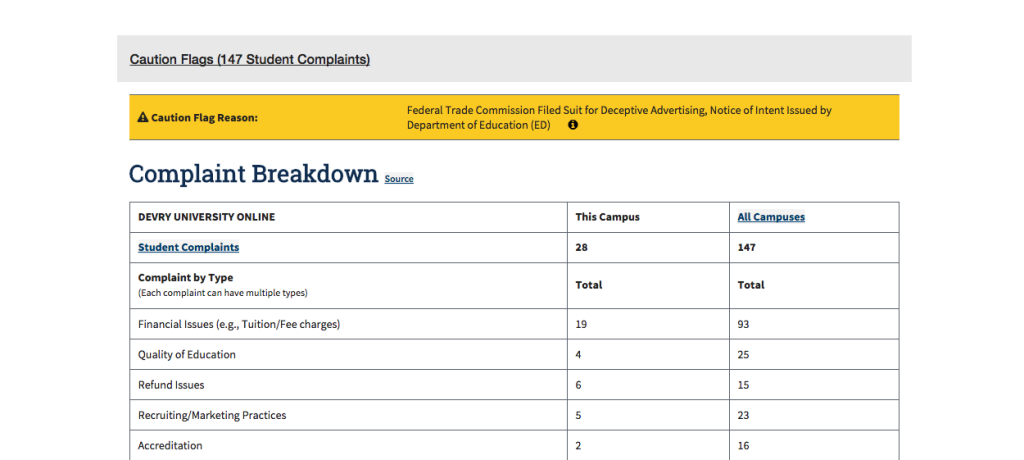VA Suspends DeVry University’s Participation In “Principles Of Excellence” Program
The Department of Veterans Affairs announced Monday that it would suspend DeVry University’s status as a Principles of Excellence institution after reviewing a federal lawsuit that accuses the popular for-profit college chain of deceiving prospective students about their employment potential after graduation.
The VA’s Principles of Excellence status is bestowed on schools that agree to provide students with a personalized form covering the total cost of an education program, ensure accreditation of all new programs prior to enrolling students, and end fraudulent and aggressive recruiting techniques and misrepresentations.
Prospective and current DeVry students can use the VA’s GI Bill Comparison tool to see a schools status in the Principles of Excellence program, as well as complaints about the institutions.
 As of Monday, the listing for DeVry includes a “Caution Flag” notifying visitors that the Federal Trade Commission has filed a lawsuit against the school and that the Department of Education has filed a notice of intent to limit the college’s representations, such as those regarding a students’ post graduation employment outcomes.
As of Monday, the listing for DeVry includes a “Caution Flag” notifying visitors that the Federal Trade Commission has filed a lawsuit against the school and that the Department of Education has filed a notice of intent to limit the college’s representations, such as those regarding a students’ post graduation employment outcomes.
“The Department of Veterans Affairs (VA) has suspended DeVry University’s status as a Principles of Excellence (POE) institution following VA’s review of the recent lawsuit filed by the Federal Trade Commission,” the VA said in a statement. “VA is also conducting compliance reviews at all DeVry campuses to measure compliance with federal regulations. VA remains committed to working with our ED, FTC, and State Approving Agency partners to ensure Servicemembers, Veterans, and their dependents are not misled by educational institutions offering VA-approved programs.”
The FTC filed its lawsuit [PDF] against DeVry in late January, seeking to return millions of dollars to thousands of students who were, according to the complaint, misled by the school’s advertisements and marketing about the high likelihood of students finding gainful employment in their fields of study and the potential for earning more than students from other programs.
Beginning in 2008, DeVry claimed that 90% of its graduates actively seeking employment landed jobs within their field within six months of graduation. However, according to the FTC’s lawsuit that claim was deceptive.
“In some instances when Defendants make this representation, they claim this statistic applies to [DeVry] graduates from a recent year, while in other instances, [the ads] claim this statistic applies to all graduates since 1975, or ‘for more than 30 years,’” the complaint states.
The FTC alleges that DeVry’s marketing became even more irresponsible in 2013. That’s when the school began claiming that DeVry students earned 15% more one year after graduating than students at all other colleges and universities.
These claims, along with others, appeared in DeVry’s television, radio, online, print, and other media advertisements.
For example, a television ad that ran nationally showed people in business attire hanging hundreds of “offer letters” on a wall, with a voiceover discussing the importance of getting a job offer to college students. The voiceover said all of the offer letters seen came from just the last year – followed by the 90% claim.
The FTC alleges that DeVry was able to “support” these claims by counting numerous graduates as working in their field when they were not.
For example, the FTC claims, in 2012 the school counted graduates as employed in their majors when in reality they held volunteer positions, or worked in unrelated fields such as a car salesman, and as delivery drivers.
The company also allegedly included in placement calculations positions in which graduates were working prior to enrolling at DeVry, as opposed to those they landed after graduating.
Following the FTC’s lawsuit, the Department of Education announced it would take steps to limit the school’s use of placement rate and employability advertisements and other representations.
The notice [PDF] requires DeVry to, among other things, cease making such representations without possessing student-specific information that substantiates the representations; retain an independent auditor to verify, before publication, any representations made regarding the post graduation employment outcomes of its students; and retain records used to develop and substantiate certain advertisements.
Want more consumer news? Visit our parent organization, Consumer Reports, for the latest on scams, recalls, and other consumer issues.

